Why Do Pedestrian-Motor Vehicle Crashes Occur?
All drivers in Maine are responsible for seeing pedestrians and avoiding them if possible. Insurance companies are quick to try and shift blame to the pedestrian, but the reality is that oftentimes pedestrians are forced to walk on the road, especially during the wintertime when snow and ice make sidewalks or shoulders of the road impassable.
There are many reasons why motor vehicle versus pedestrian crashes occur, including:
- Diminished perception of risk – impaired by alcohol or distractions like cell phones
- Individual perception of speed and crossing device
- Speed of vehicle, type of vehicle, and the volume of traffic
- Weather conditions
- Poorly timed traffic signals, absence of sidewalks, lack of crossing devices, width of the road
- People with limited mobility
- Construction obstacles
- Perception of enforcement risk and unawareness of traffic laws
We rely on a vast network of investigators and experts to help us with our investigation. We will also track down any eyewitnesses, police reports, and medical records associated with your case to paint a clear picture of what happened. Even if you were partially responsible for what happened, you may be entitled to some compensation under Maine law.
Consequences of Pedestrian Accidents
The IIHS reports that most pedestrians are struck by the front of a car. The victim’s fate depends upon the vehicle’s speed, the relative heights of the pedestrian and the front end of the vehicle, and the angle of the hit.
More serious injuries occur when:
- The vehicle is larger, as the pedestrian usually gets thrown to the ground in front of the vehicle upon impact.
- The pedestrian is smaller, with young children being struck in the thigh and torso.
- The speed is higher, as victims slide over the hood and windshield, with injuries to the head, legs, and arms.
Quite often, pedestrians suffer the brunt of the injuries, including:
- Traumatic brain injury
- Spinal cord injury
- Paraplegia and Quadriplegia
- Fractured bones
- Coma
- Death
Injured victims may be eligible for compensation to recover past, present, and future medical bills; disability-related devices or home modifications; lost productivity and loss of future earning capacity; emotional pain and suffering; loss of consortium; and, in cases of death, loss of companionship and funeral expenses.




